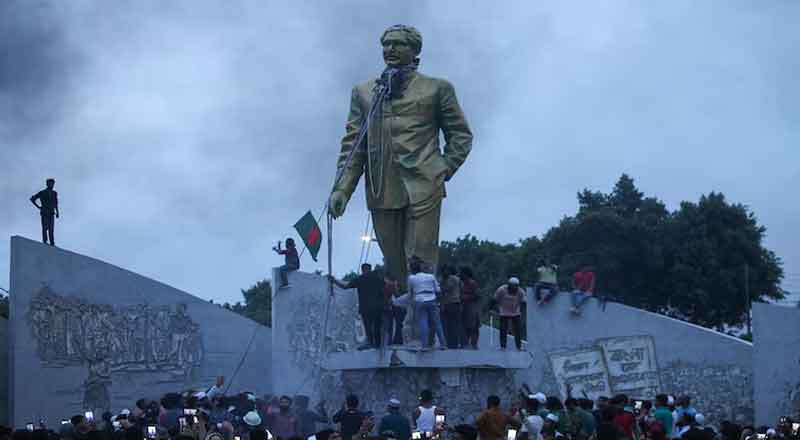The Evolving India-Bangladesh Relationship
India and Bangladesh share a deep historical, cultural, and geopolitical bond that has shaped their relations over the years. The governments of both nations have worked closely on issues ranging from trade, security, and regional stability to economic cooperation. The leadership of Prime Minister Sheikh Hasina was marked by a period of strengthened ties with India, particularly in trade and counter-terrorism cooperation. However, the recent political transition in Bangladesh, marked by the rise of an interim government led by Nobel Laureate Muhammad Yunus after Hasina’s exit, has led to significant diplomatic shifts, raising concerns about the future of bilateral relations.
Envoys Recalled Amid Diplomatic Reshuffle
In a move seen as a significant diplomatic reshuffle, the interim government of Bangladesh has recalled its envoys from several countries, including India. The Bangladeshi Ambassador to India, Mustafizur Rahman, along with envoys from Brussels, Canberra, and Lisbon, were instructed to return to Dhaka immediately. This reshuffle comes amidst a period of heightened political tension following the ousting of Sheikh Hasina’s government. The abrupt recall of diplomats is perceived as part of a broader reorientation of Bangladesh’s foreign policy under Yunus’ leadership.
Yunus’ Interim Government and the Diplomatic Fallout
Muhammad Yunus, a globally recognized Nobel Laureate and social entrepreneur, assumed leadership of the interim government in Bangladesh following widespread student protests that led to the ousting of former Prime Minister Hasina. Yunus, known for his advocacy of social business and poverty alleviation, now faces the complex task of managing both internal challenges and foreign relations, particularly with neighboring India.
The recall of the Bangladeshi ambassador to India comes after months of diplomatic tensions between the two countries. Relations between India and Bangladesh have been strained since the fall of Hasina’s government, with the interim administration under Yunus pursuing a more independent foreign policy. This shift is also reflected in the dismissal of two Bangladeshi diplomats working at the Indian High Commission in August, which signaled a growing rift.
Tensions with India and Trade Concerns
India, a key ally of Bangladesh during Hasina’s tenure, is now facing a period of uncertainty in its relations with Dhaka. The diplomatic recall coincides with Bangladesh’s temporary ban on the export of Hilsa fish, a staple in West Bengal, which led to tensions between the two nations. While the trade of Hilsa has resumed, the underlying diplomatic unease remains, exacerbated by allegations from minority groups in Bangladesh of attacks on Hindus since the political transition.
These tensions have raised concerns about the future of India-Bangladesh relations, particularly in terms of trade, security, and regional cooperation. Both countries have a history of working together on issues such as cross-border terrorism, energy cooperation, and river management, all of which may now be subject to renegotiation under the new leadership in Dhaka.
Yunus Prepares for Bilateral Talks with Malaysia
In the midst of these diplomatic tensions, Bangladesh is preparing for high-level talks with Malaysia, a key regional partner. Malaysian Prime Minister Anwar Ibrahim is set to visit Dhaka to explore new areas of cooperation, marking the first visit of a Malaysian leader to Bangladesh in nearly a decade. The talks are expected to cover a range of topics, including trade, investment, defense cooperation, and education.
This visit underscores Bangladesh’s pivot towards strengthening ties with other regional powers, potentially at the expense of its historically strong relationship with India. Malaysia, which has long-standing economic and political ties with Bangladesh, is expected to play a more significant role in the country’s development, particularly in the fields of human resource development and infrastructure.
The Future of India-Bangladesh Relations
As Bangladesh navigates this period of political transition under Yunus’ interim government, its relationship with India remains in a delicate state. The recall of ambassadors and the recent diplomatic standoff suggest a recalibration of Bangladesh’s foreign policy. While it remains unclear how long the interim government will remain in power, or whether Yunus will pursue a lasting leadership role, the shifting dynamics between Dhaka and New Delhi will have significant implications for the region.
India, which has historically been a strong supporter of Bangladesh’s economic and political stability, may need to reassess its approach to maintaining strategic ties with its neighbor. Much will depend on how Yunus balances internal political reforms with external diplomatic relations, particularly with India, which remains a key player in South Asian geopolitics.
(With inputs from agencies)





